
search
Wednesday, October 31, 2007
France Badly Discredited by Obedience to US

US Made to Change Game after Iran's Cooperation with IAEA

Tuesday, October 30, 2007
India-Pakistan-Iran Pipeline Project , Will it work ?
 The India-Pakistan-Iran pipeline project is facing serious hurdles including pricing and fierce opposition of the U.S. government for some times. For India, Iran, world’s second largest oil and gas proven reserves, is a big market and an important access route to Central Asia and Afghanistan.
The India-Pakistan-Iran pipeline project is facing serious hurdles including pricing and fierce opposition of the U.S. government for some times. For India, Iran, world’s second largest oil and gas proven reserves, is a big market and an important access route to Central Asia and Afghanistan. According to some political experts, the IPI project will be proved as the mother of all confidence-building measures between these two neighboring countries. They have even called the IPI project as the ‘Peace Pipeline’
The U.S. concerns over the IPI project is not linked to the economic side of the deal but to Washington’s Iran policy. The US has had not good relations with Iran since the 1979 revolution. In past some years, the US administration has been accusing Iran for carrying nuclear-weapon ambitions.
India has come under greater pressure because of the development of bilateral relations with US. The Indo-US nuclear deal, which gives India’s nuclear capability a legitimacy, the first one outside the Non-Proliferation Treaty, may force India to come out of the Iran pipeline deal.
The IPI is being perceived as running against this broad strategic American perspective where India is being emerged as an ally to counter China’s rising power and Iran regional importance.
However, the fact of the matter is that regional pipelines actually contribute to the sustainable growth and stability of the linked regions. The IPI project will do the same for the three countries involved in the project for sure. more
On Track for U.S Collapse
ElBaradei urges full transparency from Iran
 Oct 29 - The head of the U.N. nuclear watchdog said on Monday Iran's agreement on a plan to resolve questions about its nuclear program was important but "active cooperation and transparency" would be key to its success.
Oct 29 - The head of the U.N. nuclear watchdog said on Monday Iran's agreement on a plan to resolve questions about its nuclear program was important but "active cooperation and transparency" would be key to its success.In a speech to the U.N. General Assembly in New York, Mohamed ElBaradei, the chief of the International Atomic Energy Agency, said it was regrettable that Iran had not suspended uranium enrichment and was continuing to build a heavy water reactor at Arak, contrary to Security Council decisions.
He said Iran had recently provided additional information and access to resolve "a number of outstanding issues, such as the scope and nature of past plutonium experiments." "While the agency so far has been unable to verify certain important aspects relevant to the scope and nature of Iran's nuclear program, Iran and the secretariat (of the IAEA) agreed in August on a work plan for resolving all outstanding verification issues," ElBaradei said.
He said those issues were at the core of lack of international confidence about Iran's program. Washington and other Western countries suspect Tehran is developing nuclear weapons, a charge that Iran has denied.
ElBaradei said Iran's agreement on a work plan with a defined timeline for addressing the various issues was "an important step in the right direction." "Naturally, Iran's active cooperation and transparency are key in this regard," he said. He said that if the IAEA was able to provide "credible assurance" that Iran's nuclear work was peaceful, it would help build international confidence and "create the conditions for a comprehensive and durable solution." ElBaradei has said Iran was years away from having the ability to produce a nuclear weapons and that there was still no evidence Tehran was building a bomb
source
Globalists attempting to depopulate the world
 Leuren Moret is an American independent scientist and international expert on radiation and public health issues.
Leuren Moret is an American independent scientist and international expert on radiation and public health issues.She has devoted her life to awakening the public to the destructive consequences of the depleted uranium munitions used by the U.S. military and has made relentless efforts to stop the United States from destroying the environment. Following is the text of a Press TV interview with Leuren Moret published on October 25:
Sanctions against Iran Indicative of US Paralysis
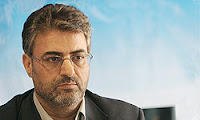
Monday, October 29, 2007
Iran says the US backing terrorists
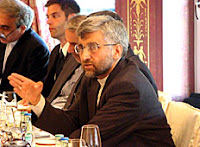
Sunday, October 28, 2007
DEJA VU? NO EVIDENCE IRAN IS BUILDING NUKES.
 Chief UN atomic watchdog Mohamed ElBaradei said Sunday he had no evidence that Iran is building nuclear weapons and accused US leaders of adding “fuel to the fire” with recent bellicose rhetoric.
Chief UN atomic watchdog Mohamed ElBaradei said Sunday he had no evidence that Iran is building nuclear weapons and accused US leaders of adding “fuel to the fire” with recent bellicose rhetoric. “Even if Iran were to be working on a nuclear weapon … they are at least a few years from having such a weapon [..] at this stage we need to continue to work through creative diplomacy … as I don’t see any other solution than diplomacy and inspections.”
The White House rejects the idea that “Iran rhetoric” is similar to our build up prior to invading Iraq.
The world is rightly concerned that the United States might pick another fight in the middle eastread more
US WAR ON IRAN : Closer to Reality
Washington society has been chattering about the risk of war with Tehran. It's an open secret that Vice President Dick Cheney has made bombing plans, but even high-ranking military experts think an attack would lead to world economic chaos, or even what George W. Bush calls 'World War III.
Shirin Ebadi: Iranians will Respond to Aggressors
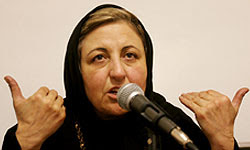 The Iranian Nobel Peace Laureate Shirin Ebadi warned West, specially France, against invasion of Iran, stressing that in case of an enemy attack, the Iranian people will give a proper response to the aggressors
The Iranian Nobel Peace Laureate Shirin Ebadi warned West, specially France, against invasion of Iran, stressing that in case of an enemy attack, the Iranian people will give a proper response to the aggressorsGerman FM Warns against Military Action against Iran
 German Foreign Minister Frank-Walter Steinmeier on Saturday warned against any "military adventures" against Iran over its nuclear programs.
German Foreign Minister Frank-Walter Steinmeier on Saturday warned against any "military adventures" against Iran over its nuclear programs. Iran says ME tensions will propel oil price to $120

Iran urges US to find strategy to resolve its regional problems
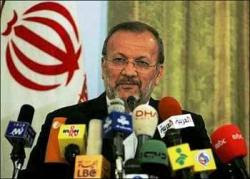 Mottaki recommended the United States to find a strategy for resolving its problems in the region.
Mottaki recommended the United States to find a strategy for resolving its problems in the region.Iranian Foreign Minister Manouchehr Mottaki :
Sanctions will not resolve US problems. Americans (officials) should respect Iran's rights and the Islamic Iran asks for nothing other than its rights." "Condemning an official institution of a country's military forces at the parliament of another country against international laws and regulations will not be supported by international community.
"If you develop a wrong approach, this wrong approach can be repeated in other places.
There are two approaches for dealing with issues, "One is to have interaction and the other to confront." "We have chosen the first option which is supported by the international community. Therefore, we advise Americans (officials) to avoid further isolating themselves .
irna
Saturday, October 27, 2007
Iranian missiles no threats to any countries
 Iran Defense Minister Brigadier General Mostafa Mohammad NajjarIranian :
Iran Defense Minister Brigadier General Mostafa Mohammad NajjarIranian :Those rhetorics were only aimed at "justifying the US plans to make a missile shield in the Republic of Czech, a plan which is increasingly opposed by European public opinion,"
Friday, October 26, 2007
Cheney after seizure of Middle East oil wealth
 The former commander of the Islamic Revolution Guards Corps of Iran (IRGC) :
The former commander of the Islamic Revolution Guards Corps of Iran (IRGC) : Cyrus the Great Day

And save the town, home and mausoleum of this father of Human Rights
Putin Denounces `Madman' With Knife Approach to Iran
 Oct. 25
Oct. 25Attacking Iran Would be sheer folly
Some analysts believe that the Bush administration decision to ratchet up sanctions against Iran is another step towards a pre-determined outcome war with Iran. It would also be an act of folly.
Sanctions might increase the temperature but thats all they usually do. So other than being a gratuitous signal of hostility in an already hostile, non-talking terms relationship sanctions wont achieve much. read more
Will the USA attack Iran?

- Firstly, Americans are weary of war. Any politician that is likely to endorse further war in the Middle East, regardless of the target, will be viewed in a negative light.
- Second, it would serve American interests in a major and effective way to have Israel launch the first blow
Bush Lies About Iran

Bush heads for miscalculation on Iran
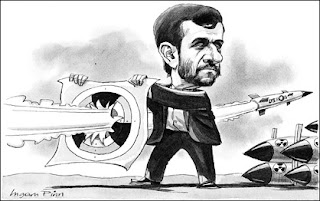
By Philip Stephens :Published: October 25 2007
George W.Bush warns that Iran’s nuclear ambitions threaten world war three. Vice-president Dick Cheney speaks of “serious consequences” unless Tehran falls into line. Joe Lieberman, the independent Democrat, says we are already fighting world war four against Islamist radicalism. As someone in the Hollywood movie said, it is time for the rest of us to be afraid, very afraid.
Afraid, though, of what? Of Tehran’s nuclear programme? Or of the possibility that Mr Bush, in the darkening twilight of his presidency, is preparing to launch a preventative military strike. The answer is both.
The big story, you might think, should be the menace to regional and global security posed by Iran’s development of the technology that would give it nuclear weapons. This, after all, is not a nice regime. You do not have to be an apologist for Washington to note that Mahmoud Ahmadi-Nejad, the Iranian president, has spoken of wiping Israel from the face of the globe. Nor to notice Tehran’s unapologetic sponsorship of terrorism. The regime’s human rights record is the wrong side of appalling.
Yet the White House once again seems hell-bent on being outwitted in the court of global opinion; and, maybe, on making a strategic miscalculation that could make the war in Iraq look like a sideshow.
Speculation about a US-backed Israeli or a direct American attack on Iran’s nuclear installations has ebbed and flowed for several years. In the immediate aftermath of the toppling of Saddam Hussein, “Iran next” was the stock refrain of the Washington hawks. The bellicose rhetoric was stilled for a time by Iraq’s descent into chaos. But it has never gone away, even as some of the most ardent advocates of another war in the Middle East have left the administration. Only the other day I heard John Bolton, the former US ambassador to the United Nations, say he was sure that Mr Bush would do “the right thing”.
The rising tempo of speculation is easily explained. The starting point is the political timetable. If Mr Bush does intend to act, he has to do so soon. The window of opportunity for an attack, the conventional wisdom has it, will close next summer. Even this president cannot take the nation into another war of choice once the 2008 election campaign is under way.
This ticking political clock coincides with a hardening view in Washington, and in one or two European capitals, that coercive diplomacy has done nothing to shake Iran’s resolve to acquire the means to make the bomb.
The apparent demotion of Ali Larijani as Iran’s chief nuclear negotiator seems to speak to the same conclusion. Mr Larijani has been as firm as any in Tehran about Iran’s right to pursue nuclear enrichment, but he has also been willing to talk. Mr Ahmadi-Nejad, we might conclude, means it when he says the nuclear dossier is closed.
Russia’s Vladimir Putin’s objections to further UN sanctions has likewise strengthened the hand of those who say that diplomacy has run its course. Earlier this year Iran outflanked the so-called European Union 3 – Britain, France and Germany – by opening direct talks with the International Atomic Energy Agency. Now Mr Putin is blocking another UN resolution.
Nervousness about US intentions, meanwhile, has been heightened by speculation that Mr Bush could treat Iran’s support for Shia militias in Iraq as a casus belli. A senate motion ,co-sponsored by Mr Lieberman, calls for the Revolutionary Guards to be designated a terrorist organisation. That could provide the president with the political cover to bomb training camps within Iran.
The calculation, if you could call it that, would be that such attacks would destabilise Mr Ahmadi-Nejad and, in the best case, see him toppled. Logic suggests the reverse: an upsurge of nationalist sentiment would bolster support for the regime. For some people, though, logic does not count.
The thing I find most striking in conversations with western officials is simply how little is known about Iran: about the power balance within the regime, the dynamics of the nuclear programme and, critically, how far that programme has progressed.
A little while ago I heard one such official discuss the state of knowledge gleaned by various intelligence agencies. The Israelis thought Tehran was two years from acquiring the bomb; but they had been saying two years for as long as this official could remember. The Russians suggested that Iran was as much as a decade away from mastery of all the necessary technology. As for the US and the big European agencies, three to six years seemed to be a rough consensus. In other words, the spooks, once again, are being forced to make judgments while wearing blindfolds.
There is a similar lacuna of understanding of the political power balance. Take Mr Larijani’s troubles. Do they signal that Mr Ahmadi-Nejad has won a struggle with Ayatollah Ali Khamenei, Iran’s supreme leader, over control of the nuclear dossier? Or has a visible backlash against the move – it now seems Mr Larijani will keep a place in the Iranian nuclear delegation – delineated the limits of Mr Ahmadi-Nejad’s authority?
Diplomacy has not yet been exhausted. Russia’s position is more subtle than it sounds. For all the pleasure he takes in discomfiting the US, Mr Putin has more to fear from a nuclear-armed Iran. In any event, the US decision to leave it to the EU3 to do all the talking with Tehran has ensured that real negotiations have never properly started.
The US has yet to play its highest card: an offer, comparable to that made to, and accepted by, North Korea, of a comprehensive refashioning of the strategic relationship between the US and Iran. Unless and until that bargain is explored, it will never be clear whether Tehran could be persuaded to eschew the nuclear course.
Mr Bush is not alone in framing a simple choice between Iran’s acquisition of nuclear weapons and war. Nicolas Sarkozy, the French president, has said much the same. It is a false choice. Even putting aside the chaos that would ensue from Tehran’s certain retaliation against any attack, the likely consequence of such thinking is war and a nuclear-armed Iran.
Last month, at a conference hosted by the Konrad Adenauer Foundation’s Washington office, one of those present recalled being taught by Henry Kissinger at Harvard. China had just tested the bomb and a fellow student suggested that the answer was a pre-emptive strike against its nuclear installations. And just how frequently should the US repeat the exercise? Mr Kissinger asked in response. Mr Bush might ask himself the same question.
ad
Blog Archive
-
▼
2007
(68)
-
▼
October
(27)
- France Badly Discredited by Obedience to US
- US Made to Change Game after Iran's Cooperation wi...
- India-Pakistan-Iran Pipeline Project , Will it work ?
- On Track for U.S Collapse
- ElBaradei urges full transparency from Iran
- Globalists attempting to depopulate the world
- Sanctions against Iran Indicative of US Paralysis
- chicago people Anti war movment: STOP THE WAR
- American propaganda
- Iran says the US backing terrorists
- DEJA VU? NO EVIDENCE IRAN IS BUILDING NUKES.
- US WAR ON IRAN : Closer to Reality
- Shirin Ebadi: Iranians will Respond to Aggressors
- German FM Warns against Military Action against Iran
- Iran says ME tensions will propel oil price to $120
- Iran urges US to find strategy to resolve its regi...
- iran or bust
- Stop Fearmongering About Iran : Bill Maher
- Iranian missiles no threats to any countries
- Cheney after seizure of Middle East oil wealth
- Cyrus the Great Day
- Iraq,Iran ..same propoganda right?
- Putin Denounces `Madman' With Knife Approach to Iran
- Attacking Iran Would be sheer folly
- Will the USA attack Iran?
- Bush Lies About Iran
- Bush heads for miscalculation on Iran
-
▼
October
(27)







